Bread for
Peace in East Jerusalem
Adrian Grima interviews Jack Arbib - Part II
Photos by Jack Arbib
Youngsters from Beresheet
On June 1, 2005, Bread for Peace Day, 50 Israeli women passed the checkpoint to meet 50 Palestinian women in front of the bakery of Samar Sahhar in Bethany, East Jerusalem, Palestine, to bake bread and share it. Jack Arbib talks about "an unforgettable day for me and for all those who participated," about Samar Sahhar and Angelica Calò Livnè, and other ways of opposing the occupation. You have been living in Israel since 1967. Can you tell us about your experience as an Israeli Jew in a culturally and ethnically rich city like Jaffa?
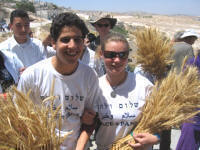 My initial motive for moving to Jaffa was essentially architectonic. I was fascinated by the vernacular and the texture of the place. Shortly after, I joined the struggle against indiscriminate destruction of the heritage of these old crumbling houses and against galloping gentrification. I cannot say that my friends and I were particularly successful as custodians of these universal memories.
My initial motive for moving to Jaffa was essentially architectonic. I was fascinated by the vernacular and the texture of the place. Shortly after, I joined the struggle against indiscriminate destruction of the heritage of these old crumbling houses and against galloping gentrification. I cannot say that my friends and I were particularly successful as custodians of these universal memories.
Talking of the social fabric of the place, I have been witnessing a constant degradation, as a result of neglect of an already deprived population on the one side and of encroaching criminality and fanaticism on the other. These factors feed each other.
You are involved in a host of social and cultural initiatives. Can you tell us more about them? Where does the drive (the inspiration and energy) to do all this come from?
My age. At this stage in life (the third and last horse, as Erri De Luca puts it), with the consciousness of my physical friability, the remainder of time cries for some meaningful content. This might sound futile. I will try to quote Italo Calvino quoting Cioran [French philosopher Emile M. Cioran, 1911-1995]: While the hemlock was being prepared, Socrates was learning a tune on the flute. "What purpose will this serve?" he was asked. "To know this tune before dying."
You were very much involved in the "Bread for Peace Day"
[www.breadforpeace.org -
www.MasksOff.org
] on 1 June 2005, during which 50 Israeli women passed the checkpoint to meet 50 Palestinian women in front of the bakery of Samar Sahhar of Bethany, East Jerusalem, Palestine, to bake bread and share it. At the same time, in different Italian cities, bread was also baked by mothers in schools and
passers-by in the streets.
[i] What was the aim of this initiative taken by the
Beresheet LaShalom Foundation? How did it go?
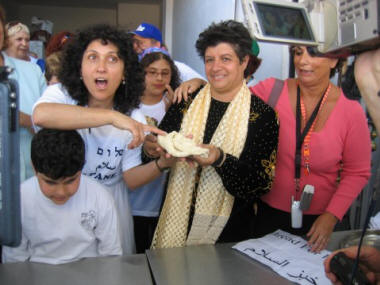 This was an unforgettable day for me and for all those who participated.
This was an unforgettable day for me and for all those who participated.
I'll say a few
words on Samar Sahhar (right) and Angelica Edna Calò (left).
[ii] These two doting and courageous women have been walking the paths of peace together, facing ostracism and even threats from their own communities. These two beautiful mothers are active in innumerable initiatives.
In addition to their everyday commitment as educators, Samar has created and runs a shelter for battered Palestinian women (The Lazarus Home in Bethania) and an orphanage for 70 Palestinian children (Jeel el Amal); Angelica has created a theatre group (Arcobaleno) of Jewish and Arab kids pledging a message of tolerance, mutual respect and love. Together with her husband Yehuda, she struggles to organize every year a summer camp for Israeli children hit and maimed (physically and psychologically) by terror.
She also raises four children of her own and managed to write two books in her "spare" time.
Samar and Angelica will respond to any call to appear before audiences anywhere with their message of sisterhood. When confronted with scepticism about their Sisyphean efforts, Samar answers with a little story: "A man saw a little bird laying on its back. "Why are you laying so?" he asked.
The birdie: "I heard that today the heavens will fall on the earth, and I want to protect it." The man laughed: " Really? You are trying to save the earth
with your tiny legs?" The bird answered: "I am trying my best."
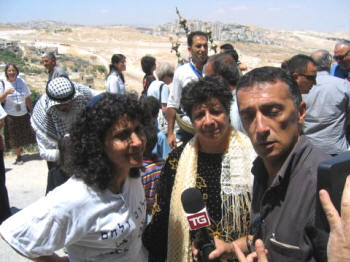 Some time ago, in order to provide jobs and food to an impoverished population in Bethany, Samar managed to raise funds to buy equipment and install a bakery on the ground floor of the Lazarus Home. To inaugurate it, this dynamic duo thought of putting together a group of Palestinian and Israeli women (and a few male escorts) to knead the dough, bake it and break bread together. After dealing with the inevitable red tape and a few other problems, on June 1, the Israeli group boarded a bus to Bethany. We weren't done with red tape and shared with others the communion of the
check post experience.
Some time ago, in order to provide jobs and food to an impoverished population in Bethany, Samar managed to raise funds to buy equipment and install a bakery on the ground floor of the Lazarus Home. To inaugurate it, this dynamic duo thought of putting together a group of Palestinian and Israeli women (and a few male escorts) to knead the dough, bake it and break bread together. After dealing with the inevitable red tape and a few other problems, on June 1, the Israeli group boarded a bus to Bethany. We weren't done with red tape and shared with others the communion of the
check post experience.
There is a whole new culture developed around this. While waiting, I noticed a Palestinian taxi by us. The driver was sitting patiently in the car. The sticker on his window read: "It's nice to be important, but it's more important to be nice."
One more thing: When we discussed the name of
the initiative, that came out very well in Hebrew and Arabic -
"Shalom ve Lehem" (bread) anagrammatically could be "Shalom Halom" (dream), "Hobz" (bread) contains "Hob" (love), in Italian "Pane e Pace," in French "Pain et Paix" are only one letter apart - for English I had proposed "A Peace of Bread," but my friends found the pun out of place and sent it to the recycle bin.
Bread is the quintessential staple. As my waistline testifies, I adore bread: our environment, our culture are shaped by this food. I remember, in my student's days, friends taking the journey to the East, coming back and relating - this was eons before the Big Mac equalizer - the infinite pleasure of finally finding bread rolls in Laos - this after months of rice diet - and polishing dishes with it. My favourite lunch is bread out of the oven with a ripe "bandoora" crushed on it, salt and oil - a Mediterranean feast fit for the gods.
Another heavenly menu would be the one dictated by "Malta hanina, hobza u sardina."
Voyagers from distant lands were greeted at the city gate with offerings of bread and salt.
"In the spirit of international solidarity, moral consistency and resistance to injustice and oppression," Palestinian civil society, supported by some Israelis, and inspired by a similar boycott of South Africa at the time of apartheid, has called for a comprehensive and consistent boycott of "all Israeli academic and cultural institutions as a contribution to the struggle to end Israel's occupation, colonization and system of apartheid" (my emphasis). [iii] Do you think that this boycott call can move respectable Israeli academic and cultural institutions to take an unequivocal position against the occupation of the Palestinian territories?
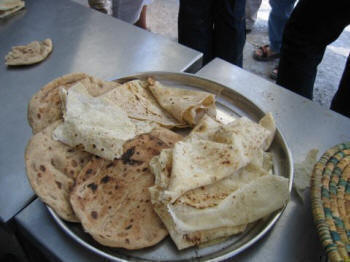
To me, this episode is one more example of how well-meaning and decent individuals can be misguided in their actions. In a world and a time, when culture and learning are constantly and globally threatened, I resent attacks to academic and cultural institutions, namely universities, wherever they might be located. Also, the attempt to boycott Haifa University does a grievous injustice to its multi-ethnic academic staff and student population. This university is one struggling example of co-existence that should be nurtured and not lashed with blind censorship. Doing that would mean destroying the breeding ground of progressive and constructive intellectual debate.
No wonder then that somebody like Sari Nusseibeh has taken a critical stand against this ill-conceived boycott. In any case, this is now water under the bridge, and opposition to the occupation should be articulated in different and less ludicrous ways.
Read Part 1 of this
interview:
"A Mediterranean and a
Jew"
[i] Follow this link:
http://www.babelmed.net/Countries/Mediterranean/Literature/index.php?c=227&m=144&k=4&l=en
[ii] Short biographies in
Italian of Samar Sahhar and Angelica Yehuda Calò Livnè appear
here:
http://www.sinistraperisraele.it/home2.asp?idtesto=289&idkunta=185&idutente=
There are many references to their work on various internet
sites.
[iii] "Palestinian Academics Call for International Academic Boycott of Israel." Statement, Palestinian Campaign for the Academic and Cultural Boycott of Israel , 7 July 2004.
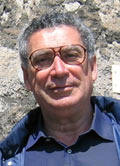
Jack Arbib